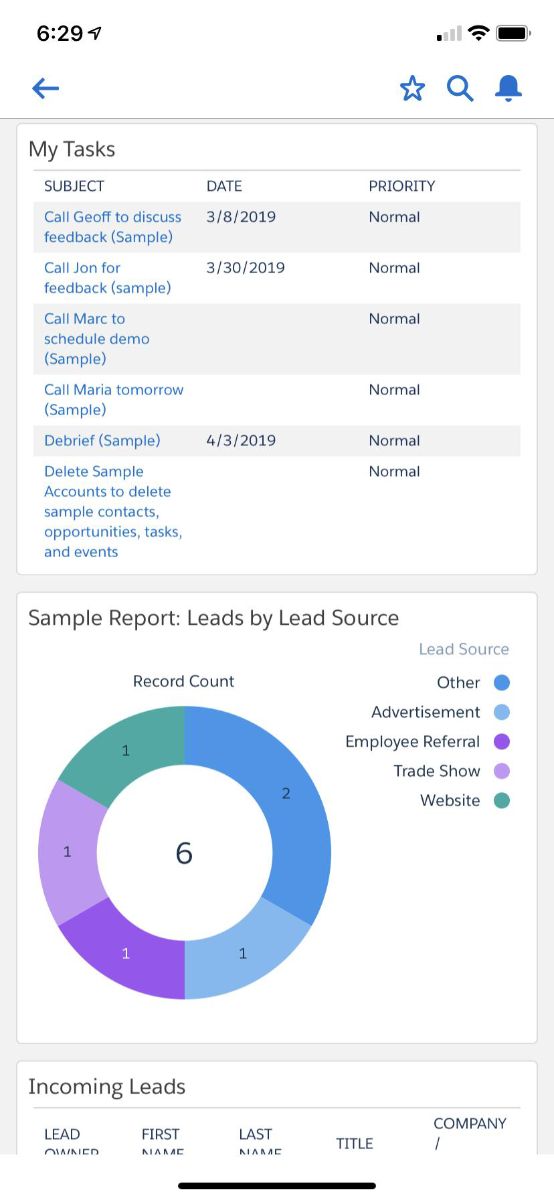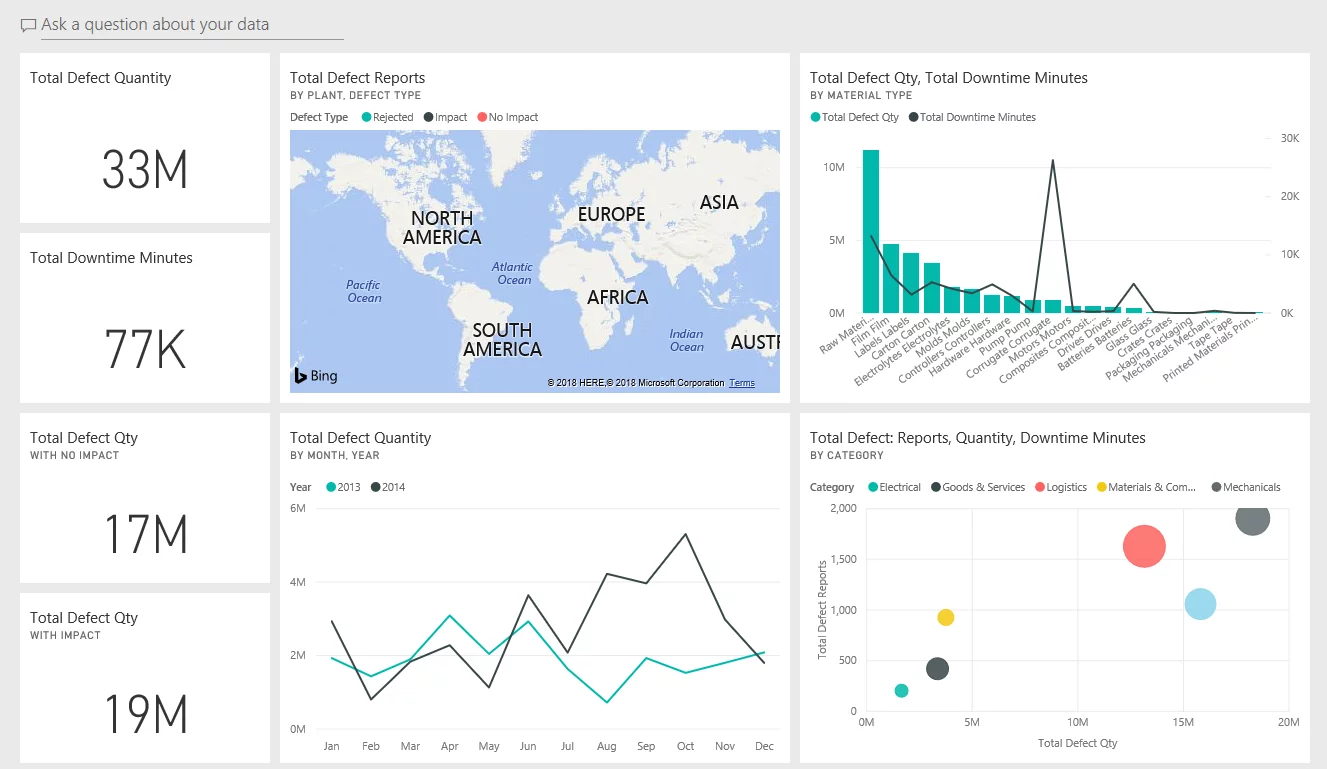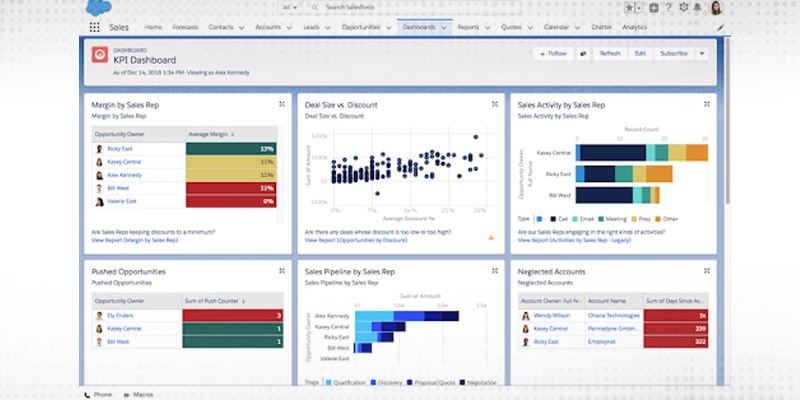
To customize a dashboard, view it and click Edit. Add a Dashboard Component in Salesforce Classic. Add components by dragging a component type onto the dashboard, then dropping a data source (report, s-control, or Visualforce page) onto it.
How to customize a Salesforce dashboard table?
The Perfect Sales Dashboard Should Have These 12 Sales Metrics
- Determine what you need to see on your sales dashboard. To get a contract signed, some sales require multiple long phone calls. ...
- Build your sales dashboard. ...
- Include these sales metrics in your dashboard. ...
- Your metrics dashboard helps manage your sales. ...
How to create an organizational chart in Salesforce?
With Salesforce and Organimi:
- Create multiple versions of your chart in Organimi for scenario planning and share them with your colleagues
- Save your Organimi org charts to pdf formats so you can track changes over time
- Share your org charts with other power users who can help you edit and update them
How do I start a career in Salesforce?
- Those who are in IT and have a background in development or Administration/Configuration of other similar tech systems.
- Those who come from a totally different industry and want to “get into Salesforce”,
- Finally students with maybe little or no IT experience.
How to create a Visualforce page in Salesforce?
To create pages in Setup:
- From Setup, enter Visualforce Pages in the Quick Find box, then select Visualforce Pages.
- Click New.
- In the Name text box, enter the text that should appear in the URL as the page name. ...
- In the Label text box, enter the text that should be used to identify the page in Setup tools, such as when defining custom tabs, or overriding standard buttons.

How do I customize my dashboard in Salesforce?
Required Editions Click Customize Page in the Dashboard section of the Home tab. Search for a dashboard and select a different dashboard from the drop-down list. Click Refresh to refresh the data in your dashboard.
How do I change the properties of a dashboard in Salesforce?
Change a Dashboard's PropertiesClick the Dashboard Properties button.Edit the dashboard title and/or folder. Make the desired changes to your dashboard.Click OK to close the Dashboard Properties dialog box.
How do I change the layout of a dashboard in Salesforce?
0:043:28II. Creating and Editing Dashboards - Salesforce.com Training - YouTubeYouTubeStart of suggested clipEnd of suggested clipFor demonstration purposes we are in a Salesforce developer edition click on the edit button to addMoreFor demonstration purposes we are in a Salesforce developer edition click on the edit button to add and edit components for your dashboard. The panel on the Left will show components.
How do I change the components of a dashboard in Salesforce Classic?
Edit a DashboardTo customize a dashboard, navigate to the Dashboard tab and select Edit.Drag the component type you want from the Components tab onto your dashboard.Drag a report from the Data Sources tab onto the component you just dropped on the dashboard. To edit an existing component, click the pencil. .
How do I customize my dashboard in Salesforce lightning?
To create or edit a Salesforce Dynamic Dashboard, navigate to the Dashboards tab, click New Dashboard to create or click on an existing dashboard to edit. First, when building a new dashboard, name it, add a description if you'd like, and select the right folder for proper organization.
How do I create a dynamic dashboard?
From the Dashboards tab, create a new dashboard or edit an existing one. next to the View dashboard as field. Note If you don't have “Manage Dynamic Dashboards” permission, enter a running user and skip to the final step. Enter “*” to see all available users.
How do I add components to a dashboard in Salesforce?
On the dashboard where you want to add a component, click Edit. ... Drag the component type you want from the Components tab onto your dashboard. ... Drag a report from the Data Sources tab onto the component you just dropped on the dashboard. ... Click.More items...
How many parts can a dashboard have?
20 componentsA dashboard shows data from source reports as visual components, which can be charts, gauges, tables, metrics, or Visualforce pages. The components provide a snapshot of key metrics and performance indicators for your organization. Each dashboard can have up to 20 components.
What are the objects components you can use in a dashboard?
There are 5 types of components in Salesforce Dashboard :Charts: Used for showing comparisons. ... Table: Tables are used for showing lists. ... Gauge. Gauge is used to show progress towards a goal.Metric. ... Visualforce. ... Folders: ... Running User:
How do I add a filter to my dashboard in Salesforce?
Edit a dashboard, and then click + Filter in Lightning Experience or Add Filter in Salesforce Classic. ) to see them. Give the filter a display name or label to identify it. If the filter has many equivalent fields, consider using a name that works for all components.
What is dynamic dashboard in Salesforce?
Dynamic Dashboard : A Dynamic Dashboard enables multiple users to access a dashboard that was previously accessed only by a single static user. This means that the dynamic dashboard can be used by a specific user alongside a logged-in user, and display data specific to both users accordingly.
What is a Salesforce dashboard component?
Dashboard components include different types of charts, tables, metrics, and gauges. You can customize the grouping, summary, and display of data for each of them. The Salesforce Dashboard Builder is an intuitive interface that allows you to generate dashboards from standard or custom reports created in Salesforce.
What is customizing dashboards?
A final common task when customizing existing dashboards is the need to add certain charts to other dashboards. You may have an executive dashboard where you may need a certain chart of a key performance indicator (KPI), or be tasked with building a dashboard for the marketing department to review in a weekly meeting, where everyone just wants to see the high level reports.
How to add a chart to a dashboard?
To add a chart to a Dashboard, and click “Edit”. Drag the Data Source (report) you want onto the dashboard, then drag the Component (chart type) on top of that to format it (or start with the Component and then the Data Source — it doesn’t matter which one you drag and drop first).
To begin customising Salesforce dashboards
To create a Salesforce Dashboard navigate to the Dashboards tab, click New Dashboard to create or click on an existing dashboard to edit:
To customise a Lightning dashboard
You can edit an existing dashboard by clicking the pencil icon on the component or add a new component by clicking + Component.
Further ways to customise your dashboard
Navigate to Setup and search Reports in the Quick Find box and select Reports and Dashboards Settings.
Before You Start
Review your company priorities before moving forward with Dashboard creation. Ask for input from your team. Here are some topics to consider.
Build a Lens
Before you build a dashboard, you need to build a lens. And of course, before you build the lens, make sure your data is clean.
Build Your Dashboard
Now that you’ve organized your data and built at least one lens, let’s look at the Dashboard Designer. This is where you pull all of your lenses together to create one unified view—that is, a dashboard.
Other Ways to Build Dashboards
You also can build dashboards using any of five templates in the B2B Analytics app.
Quiz
1 When you want to build a custom dashboard for your business, what are some considerations to discuss?

Clone / Save as
Changing Date Ranges Or Date Groupings
- One of the simplest changes to make in your dashboards is adjusting the date ranges displayed in the charts. Sometimes date ranges are just based on personal preference, but often you need to modify them based on your business. If you measure sales on a monthly basis or want to be able to see the immediate impact of a campaign, you may want to see shorter time periods, but if you…
Remove Charts You Don’T Need
- Some existing Salesforce dashboards will have a number of charts for areas where your company may not have data. For example, the CloudAmp Analytics Dashboards have charts for all 20 goals that you can define in a Google Analytics account, but most organizations only have a few goals set up for their web site. In these cases, after first cloning the dashboard it is easy to remove un…
Change Chart Types
- I prefer line graphs for most of my dashboards, but you may prefer bar charts. Or perhaps your boss just loves pie charts. Depending on the type of data in your report, it may not be advisable (or technically possible) to switch to a certain type of chart, but generally it is quite simple to change a chart type in Salesforce dashboards. After cloning your dashboard, just click “Edit”. Then go to …
Use Charts Elsewhere
- A final common task when customizing existing dashboards is the need to add certain charts to other dashboards. You may have an executive dashboard where you may need a certain chart of a key performance indicator (KPI), or be tasked with building a dashboard for the marketing department to review in a weekly meeting, where everyone just wants to see the high level report…